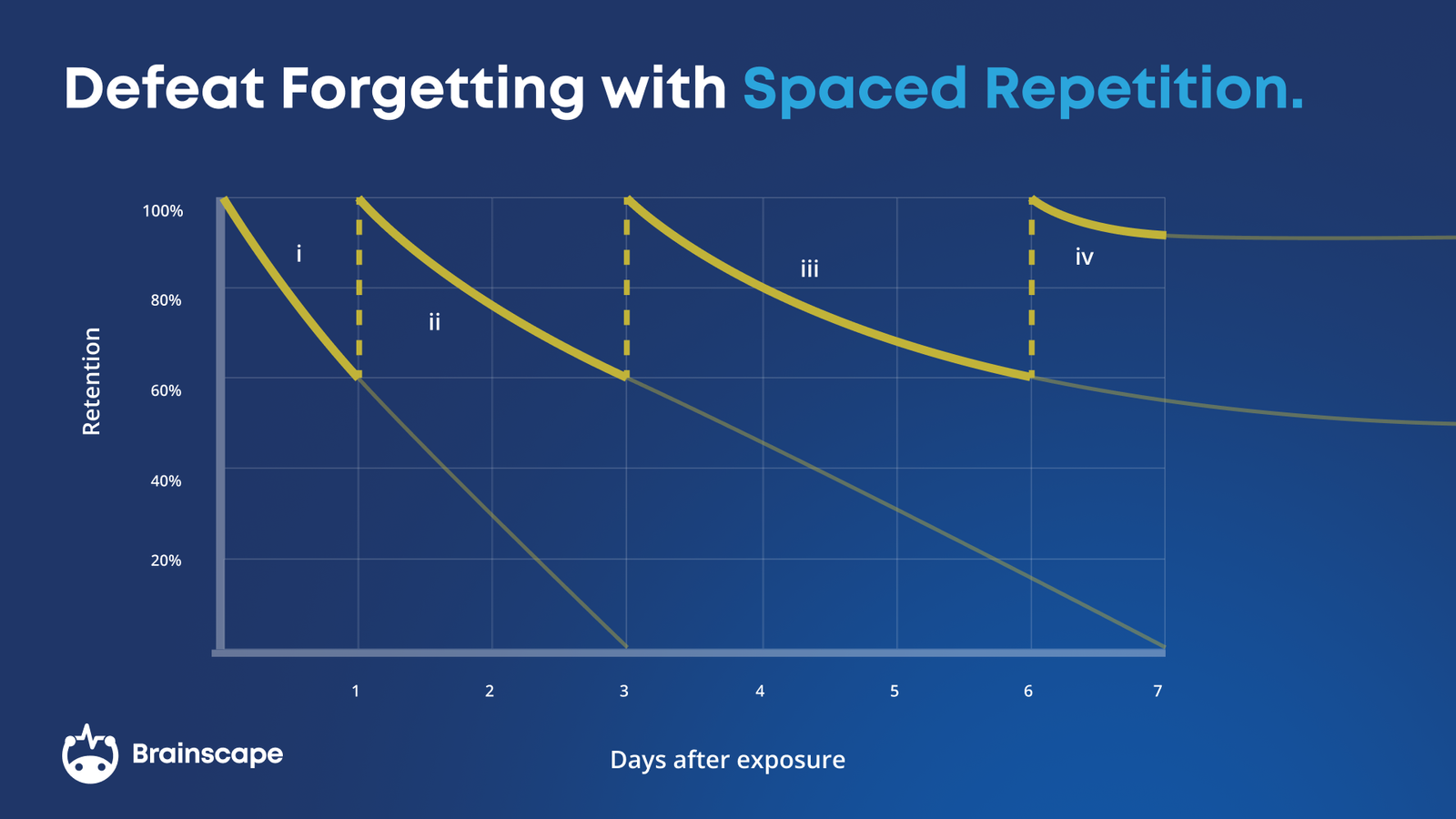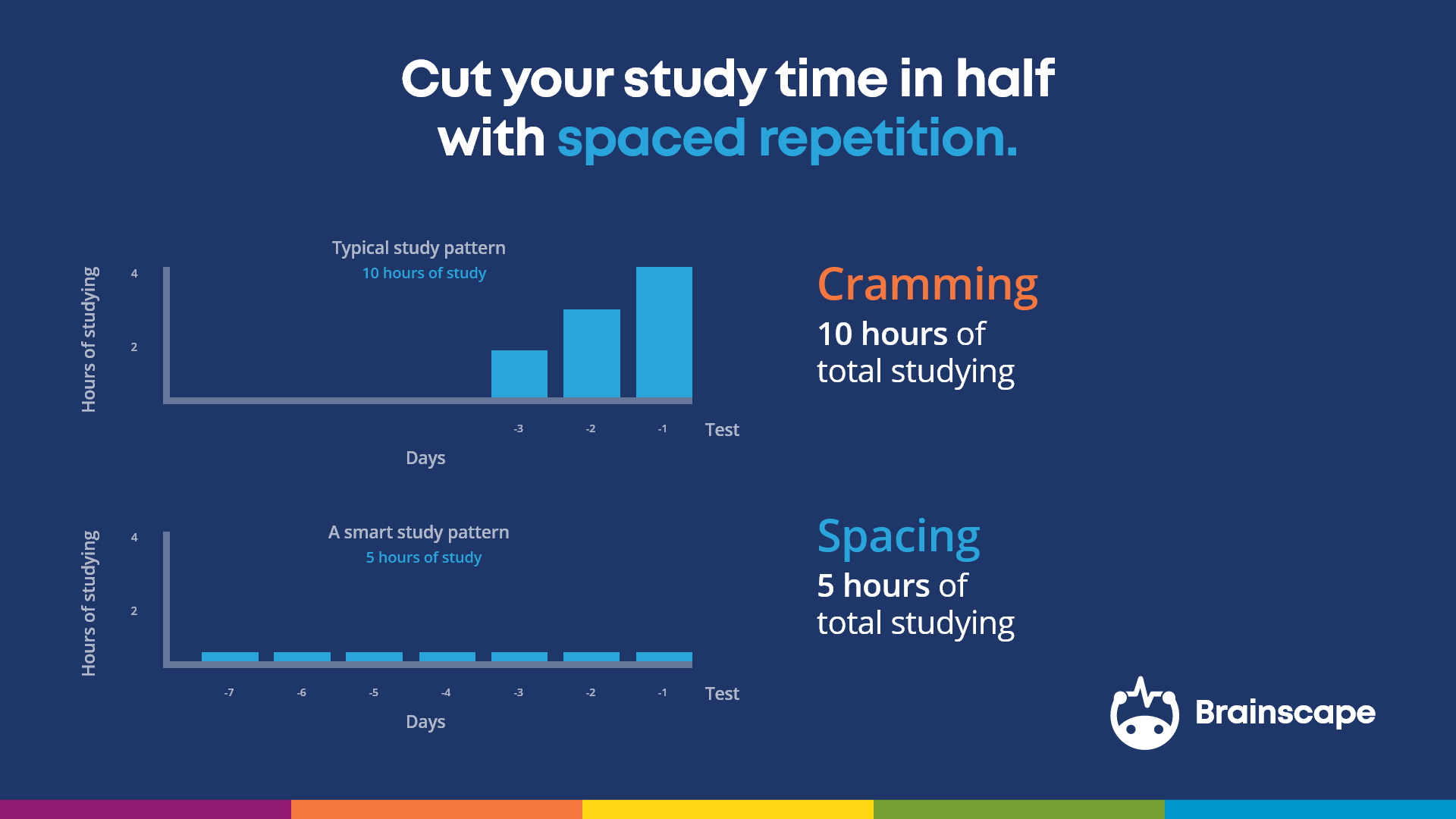Do you want to know how to make your students really LOVE you? Simply force them to study almost every day under the constant fear of a pop cumulative exam that you have threatened to spring on them at any moment.
Then, follow through with the threat a few random times throughout the semester, assessing students on all the knowledge they've learned in your class to date.
You’re going to be the most popular teacher ever!
Okay, I know this teaching strategy sounds ludicrous. The idea that your students will love you for implementing this dystopian, draconian pop quiz system in your classroom is perfectly counterintuitive. The outcome—keeping your students constantly up-to-date with what’s going on in class—may be pretty awesome. But to make them actually like and respect you for it???
Bear with me here, as this is totally possible. The secret to achieving this progressive learning system and teaching students to LOVE the system boils down to:
- The way students learn,
- The way you deliver pop quizzes, and
- Your ability to not just "impart knowledge" but to actually instill new, lifelong habits for which your students will be eternally grateful.
Sure, your students may not love your surprise cumulative pop quizzes or exams at first, but they for sure will love them when they reach final exam time and realize: I already remember all this stuff and don't have to study at all!
Your job, of course, is to manage these pop cumulative exams correctly. And in this guide, I’m going to show you exactly how to do that so that you (1) really help your students, (2) they don’t resent you for it (even at first), and (3) you barely have to do any work to maintain this process.
How Learning Really Works
For decades, educators and learning scientists have cycled through one pedagogical obsession after another.
- In the 1940s, video-based learning was supposed to revolutionize education.
- In the 1990s, Internet-based encyclopedias promised unlimited knowledge at our fingertips.
- Today, AI, gamification, and virtual reality are the latest buzzwords in EdTech.
Each of these so-called “breakthroughs” has focused on making learning more engaging—helping students absorb information in new ways. But what they don’t address is long-term retention.
The truth is that genuine, permanent learning happens through a pattern of systematic reinforcement—something we call spaced repetition.
For example, let's say you're a Spanish teacher, and you are teaching your students Lesson 17: Advanced Restaurant Concepts. You may have just come up with the world's most creative lesson to teach your students the word for "meatball" (albóndiga), including:
(i) A story about a chef making meatballs,
(ii) A skit where students practice their new restaurant terms,
(iii) A worksheet where students write about their favorite dishes, and
(iv) A tongue-twister involving this difficult-to-pronounce word.
What a great set of constructivist exercises!
Yet, no matter how brilliant your lesson, I guarantee you that if your students aren't systematically revisiting the word albóndiga in the following days and weeks, they will forget it.
When cramming for their next scheduled test (as you know they will), they will likely have to re-learn the word again from scratch when studying. Inefficient and frustrating for you and them!
If only students could just continue to study their Spanish words and verb conjugations every day, but with expanding intervals of repetition for each concept. For example, perhaps they review the word albóndiga again two days after your award-winning restaurant lesson, then again a week later, then again three weeks later (while still reviewing other words during the "off days").

Brainscape has already shown in our spaced repetition white paper that a personalized system of persistent individual review has an impact equivalent to a personal human academic tutor. Spaced repetition is not just for academics but is actually the secret to all human development, from learning to walk to improving your guitar skills to becoming an astrophysicist.
So why shouldn't educators empower students to better incorporate spaced repetition into their daily life through the power of frequent and random (cumulative) pop quizzes?
The best part is that this doesn't even have to be an annoying or cumbersome process. It can actually make life easier for both you and your students.
Here’s how ...
The Logistics of Mini-Cumulative Exams
The trick to effectively transforming your cumulative exams process from "scheduled" to "random" is to actually think of them more like pop quizzes.
Educators who have succeeded with this practice tend to follow three core principles:
- Quiz students frequently,
- Make the quizzes short and sweet, and
- Provide students with convenient, bite-sized study tools with which they can study for just five minutes a day without having to think or plan too much.
Let's dive into each tip in a bit more detail ...
1. Give Frequent Pop Quizzes
In order to maintain the surprise element, you must administer cumulative pop quizzes frequently.
If it’s just two or three per semester, after writing one, students will know it’ll be a while before the next one and will probably end up slacking for a few weeks. This will completely negate the benefits of the lightweight daily study habits you’re trying to instill.
And so, it’s a good practice to give up to 1-3 cumulative pop quizzes per month (if not every week) but to do so in a way that will not significantly increase your burden of grading them. After all, this teaching strategy needs to be sustainable for you, too!
For example, you could begin every class with a short cumulative quiz, then have students pass the papers to the front of the classroom so that you can shuffle and redistribute them for students to grade for you.
Or, for a virtual alternative, you can try creating each pop quiz using Google Forms, which offers a simple option for turning the form into an assessment where grades are easily recorded for each student.
The important thing is to develop processes that do not add significant extra work, or else it will be too tempting to slack off and not actually assess your students frequently.
2. Make the Mini-Cumulative Exams Short and Sweet
The second important principle is to ensure that the frequent cumulative quizzes do not take up a significant portion of class time.
In fact, if you test frequently enough, it could be appropriate for you to give pop quizzes of just one to three questions or one longer written question.
I once had a calculus teacher (hi, Mr. Slater) who started every class with the "one-minute question" that covered any topic we had previously covered. It was passed out on a small slip of paper, and after the one minute was over, we just passed it to the person to our left to be graded. This took no more than two minutes of total class time every day!
(Nobody cheated the grades for their friends because we knew that Mr. Slater could double-check that the answer was indeed correct. Besides, with the one-minute time limit, nobody had time to cheat in the first place.)
3. Give Students Convenient Daily Study Tools
Up until this point, you may have been thinking about how cruel it would be to expect your students to stay perpetually prepared for a pop quiz that you might spring on them at any moment.
That's because we traditionally think of studying for a scheduled cumulative test as pulling out your textbook and notes and reviewing everything. With this mindset, a student would indeed need to sit down for several hours in order to wrap their head around all that material. And this is not feasible every day!
But if we're aiming to constantly assess student learning on all cumulative course material—and thus assume that they will be studying near daily in order to stay perpetually prepared for such cumulative assessments—then the more practical solution would be to provide a super-convenient way for students to just study for 5 minutes a day. And to ensure that they use those 5 minutes for precisely the concepts they are least confident in.
Brainscape provides exactly this tool.
With Brainscape's adaptive flashcards app, students don't even have to think about what to study next, thanks to the magic of spaced repetition. As long as they already have the material pre-divided into good flashcards, all students have to do is click (or tap) the “Study” button, and the system knows exactly which flashcards to show them. This is based on their previous confidence rating (on a scale of 1 to 5) of how well they knew each concept.
The advanced planning it takes to generate* these flashcards will be well worth the hassle.
* You can do this either by finding them on the Brainscape's marketplace, by making them yourself, by having your TA make flashcards, or by engaging your own students in a collaborative flashcard-creation activity! Or you can use our AI system to turn class notes into flashcards within minutes.
Students who spread their studies out in tiny daily sessions end up having to study for less aggregate time than students who only mass their studies before each big exam. Your students will understand and appreciate this when they take on their first major exam after a semester of relentless pop quizzes.

Studying a little bit each day is a much more efficient (and enjoyable) way to learn than cramming a lot of information right before a major assessment!
Your students should thus be easily motivated to study a little every day so that they can always feel ready for that potential pop quiz. And if the spectre of a quiz (or Brainscape's built-in habit-formation features) is not enough, then you can even assign a daily study requirement and track students' study habits using Brainscape's educator dashboard.
This brings me back to that big initial question ...
Why Your Students Will Thank You for Giving Cumulative Pop Quizzes
I admit it: When most educators tell their students that they'll be springing constant pop quizzes on them, it's not always received with great fanfare.
But, as I said before, I've never met a group of students who didn't agree that the continual assessment was great by the end of the semester. Indeed, Brainscape's top educator-users have reported four huge benefits of this teaching strategy for which their students have been eternally grateful:
- A burden-free final exam: Students who have been studying a little bit each day for the whole semester end up needing very little preparation for the final exam. While other classes are stressing out, your students will be smugly bragging about how comfortable life is in your class.
- Improved student learning: Once students have tasted the benefits of daily spaced repetition (and slashed their aggregate required study time), it will instill better study habits for life. And they will always think back to your class as the source of those habits.
- More permanent knowledge: When educators give more frequent cumulative assessments, students tend to come back years later and report that they still remember the course material, unlike their peers who usually forget everything.
- Stronger real-world skills: In the workplace, you don't just cram for a test and then have the luxury of forgetting everything in the weeks thereafter.
FAQ: Forget Pop Quizzes: Try Pop Cumulative Exams
What is the meaning of a cumulative exam?
A cumulative exam is a test that assesses knowledge across everything a student has learned in a course up to that point, not just the most recent material. These exams are designed to reinforce long-term retention and give students a comprehensive picture of their progress.
What is a pop quiz in class?
A pop quiz is a surprise test given without prior notice. Its goal is to evaluate students' ongoing understanding and readiness. It might also encourage students to stay consistently engaged with the material.
How should I study for a cumulative final exam?
The most effective approach is to review content consistently over time using methods like spaced repetition and active recall. Breaking study material into small, regular sessions is more efficient and less stressful than cramming everything at the end.
What are the benefits of a pop quiz?
Pop quizzes can help students stay up-to-date with course material, reduce procrastination, and build better long-term memory. They also encourage daily study habits, which lead to stronger academic performance and better preparation for future assessments.
A Final Word on Pop Cumulative Exams
If you're a sales rep, you need to constantly refresh your product knowledge, or you won't be able to sell as well (or earn as much commission).
Or if you're speaking Spanish, you'll need to constantly keep your vocab and verb conjugations up to date (through study or hella practice), or your skills will atrophy.
Or, if you're working your way up the company ladder, you'll want to review the names and positions of key company execs in case you run into one of them in the elevator and miss a critical schmoozing opportunity.
Thus, teaching students to become aware of their knowledge weaknesses and their need for perpetual knowledge refreshment will prepare them for success in academics, in their career, and in life.
So, I’ll ask you again: do you want to know how to make your students LOVE you?
Simply force them to study almost every day under the constant fear of a pop quiz. Then, follow through on that threat several times throughout the week, assessing students on all the knowledge they've learned in your class to date.
Suddenly, this teaching strategy doesn’t sound like such a wild idea, does it?
Additional Reading
- The Benefits of Student Self-Assessment
- Remote Learning: Essential Tips for Taking Online Classes
- Turning Flashcards into a Collaborative Class Activity
References
Paul, A. M. (2024, February 20). Researchers find that frequent tests can boost learning. Scientific American. https://www.scientificamerican.com/article/researchers-find-that-frequent-tests-can-boost-learning/
Thalheimer, W. (2006, February). Spacing Learning Events Over Time: What the Research Says. https://www.work-learning.com/catalog/
Trapulionis, A. (2021, December 14). “5 minutes a day” is the most liberating Self-Help rule there is. Medium. https://medium.com/the-ascent/5-minutes-a-day-is-the-most-liberating-self-help-rule-there-is-5d1737ccea09
University at Buffalo. (2024, March 5). Constructivism. Office of Curriculum, Assessment and Teaching Transformation. https://www.buffalo.edu/catt/teach/develop/theory/constructivism.html
